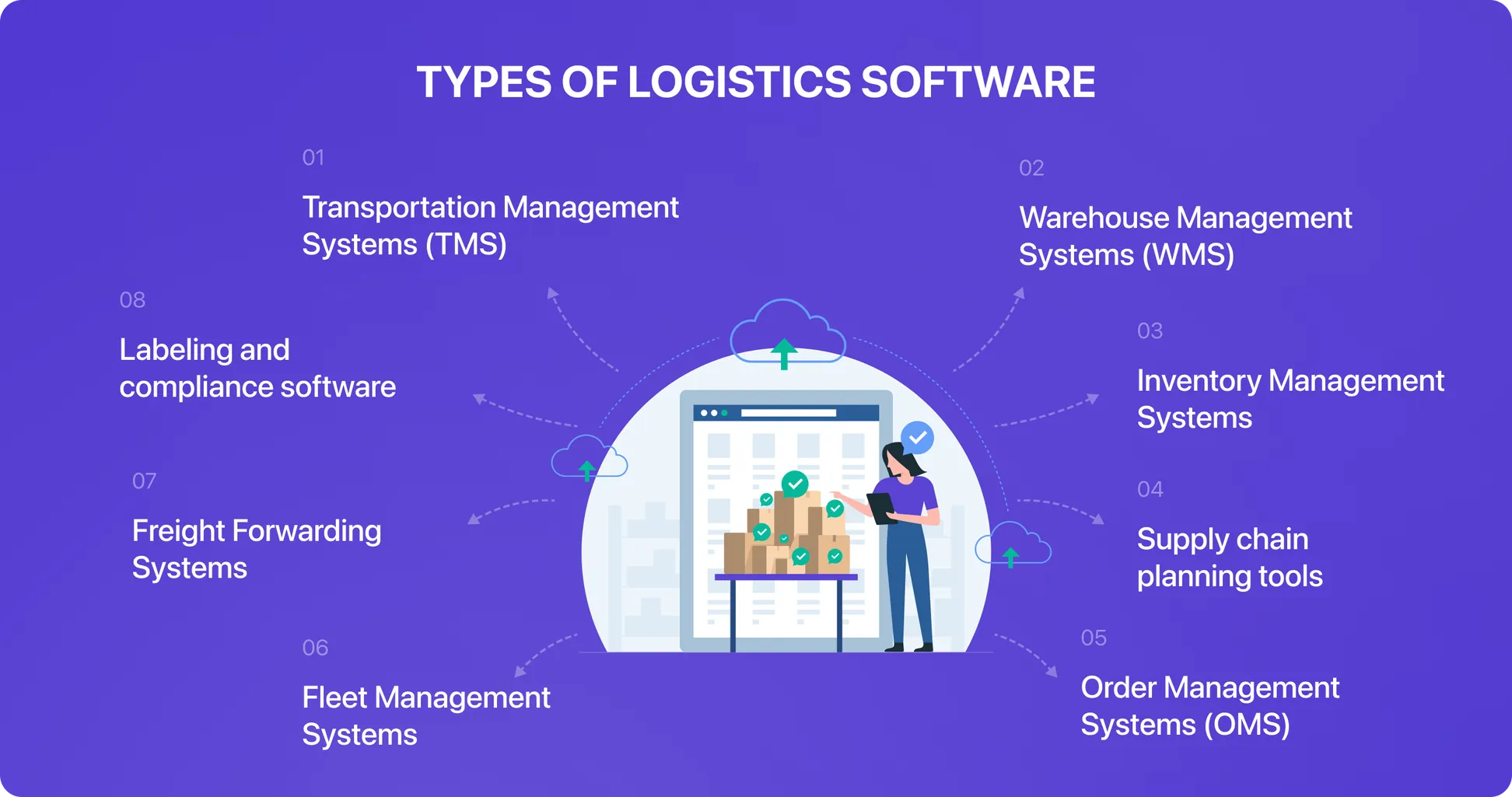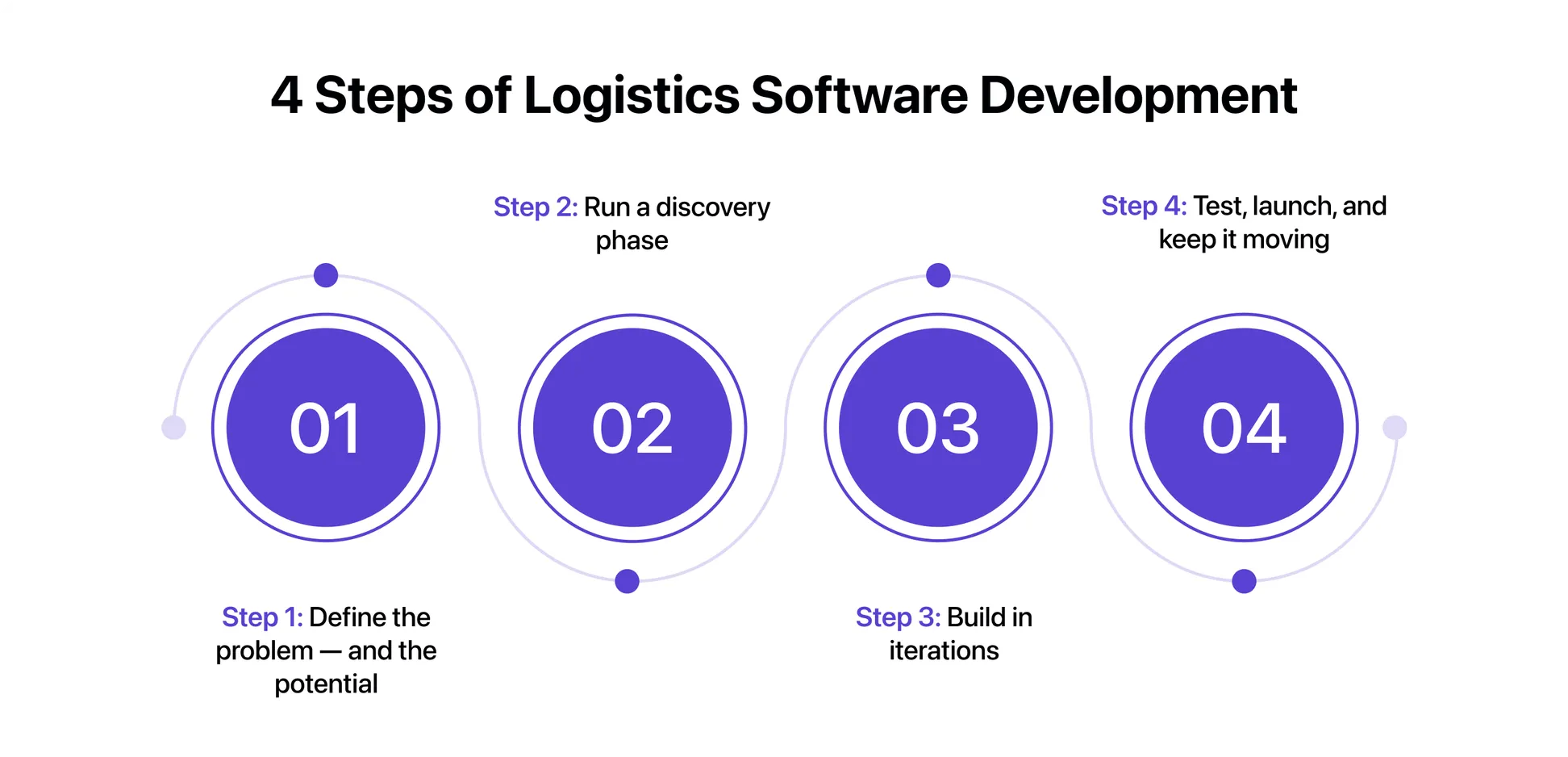Imagine you’re managing a regional distribution hub. Your team is juggling hundreds of shipments, tight delivery schedules, and coordination with carriers across multiple countries. It’s 4 p.m., and suddenly, a call comes in: a key delivery was missed because no one realized the inventory hadn’t been staged.
Sound familiar? This isn’t a one-time issue. It’s a common problem in today’s logistics operations. Between warehouse reports, transport spreadsheets, and scattered order data, information gets lost. Costs go up. Customers get frustrated.
Now scale that to a global level.
With increasing fuel costs, tighter delivery expectations, reduced inventory buffers, and cross-border challenges, many companies are coming to the same conclusion. Their outdated logistics systems aren’t cutting it anymore.
That’s why more businesses are turning to logistics software development services to create faster, smarter, and more integrated systems that help them stay competitive. But it’s not just about staying in the game. It’s about transforming how logistics operations work altogether.
Let’s break down what’s really driving this change.
Why Businesses Are Embracing Logistics Software Development Services
Modern logistics teams are under pressure to do more, with fewer resources, tighter margins, and zero room for error. Here’s what’s pushing companies toward logistics software development services:
Transportation costs keep rising
Fuel prices remain unpredictable. In 2023, U.S. crude oil hit over $90 per barrel, marking a 15% increase. For companies dealing with long-haul shipping, even minor increases in fuel costs add up fast. Route optimization and real-time tracking have become essential, not optional.
Global complexity, local impact
Global operations offer scale but also introduce risks. A delay from one supplier can disrupt the entire chain. Without a unified system, teams are left reacting instead of preventing problems. Logistics software connects regions and partners, providing visibility and control before issues escalate.
Less inventory, more SKUs
With just-in-time inventory becoming the norm, even a small delay or miscount can halt entire product lines. Precision and accuracy in logistics are now business-critical. Logistics software development services help businesses maintain that accuracy across every touchpoint.
Customers demand speed and transparency
Today’s customers want real-time updates and clear communication. If your team can’t answer basic delivery questions, trust is lost. Integrated logistics software empowers customer-facing teams with the tools and data they need.
The numbers say it all
In 2024, logistics generated $3.93 trillion globally. It’s expected to grow to $5.95 trillion by 2030. Transportation alone made up $1.16 trillion. This shift makes one thing clear: logistics is no longer just a cost. It’s a growth opportunity. Companies that invest in logistics software development services today will lead tomorrow.
What Exactly Is Logistics Software?
At its core, logistics software helps businesses move goods efficiently and predictably. That means planning routes, managing inventory, syncing supply chain operations, and ensuring every order arrives on time.
Some logistics platforms handle specific tasks like fleet tracking or warehouse management. Others provide an end-to-end solution that links all parts of the supply chain. The most effective systems share data across modules so teams can act on real-time insights instead of yesterday’s reports.
You typically have two choices:
- Off-the-shelf tools: Quick to deploy and suitable for basic logistics operations.
- Custom-built logistics software: Tailored to your specific business needs, systems, regions, or compliance requirements. For complex operations, this is often the better fit.
How to Choose the Right Logistics Software
There’s no one-size-fits-all answer. The right choice depends on where you’re feeling the most operational friction. Missed deliveries? Inventory mismatches? Underused fleet? The right tool depends on the challenge.
Here are some key categories of logistics software to consider:

Transportation Management Systems (TMS)
Ideal when delivery issues or freight costs become hard to manage. A TMS consolidates route planning, shipment tracking, and carrier data into one interface. Tools like Oracle Transportation Management make multi-stop planning and cost comparisons easier and more accurate.
Warehouse Management Systems (WMS)
When pick errors or slow onboarding are slowing you down, a WMS like SAP or Manhattan Associates brings structure. It improves shelving logic, streamlines pick-and-pack workflows, and helps avoid costly mistakes.
Inventory Management Systems
Essential for companies managing multiple sales channels. Platforms like NetSuite and Cin7 provide real-time stock visibility, helping avoid out-of-stock errors and overstocks.
Supply Chain Planning Tools
If you depend on multiple suppliers, tools like Kinaxis and Logility let you run “what-if” scenarios and plan for disruptions. These platforms help maintain continuity when delays hit one part of the chain.
Order Management Systems (OMS)
Once your business expands to multiple warehouses or 3PLs, an OMS becomes critical. It routes orders intelligently and avoids unnecessary split shipments. Salesforce OMS is a popular choice here.
Fleet Management Software
For businesses running their own fleet, systems like Geotab and Samsara reduce costs by tracking real-time performance and identifying waste such as idle time or inefficient routes.
Freight Forwarding Systems
When dealing with international shipments, compliance and documentation are key. Tools like CargoWise help centralize documentation, reduce customs issues, and keep cargo moving smoothly.
Labeling and Compliance Software
Critical in regulated industries. Solutions like Loftware ensure labels meet all regional and industry standards, which is essential for pharmaceuticals, chemicals, and food products.
The Logistics Software Development Process
If your current tools aren’t delivering, whether it’s inconsistent data, clunky processes, or missed deliveries, custom logistics software development services could be the solution.
Here’s what the process usually looks like:

Step 1: Define the challenge
Start by understanding where things are breaking down. Is inventory tracking off? Are delivery updates delayed? This step defines what needs to be fixed and what success looks like.
Step 2: Discovery phase
This is your audit. It involves analyzing systems, workflows, and user behaviors to see how everything functions. The goal is to map out the logistics landscape so your new software fits your actual operations.
Step 3: Build in phases
Don’t try to solve everything at once. Start small, test early, and involve users from day one. Good logistics software adapts to how your team works, not the other way around.
Step 4: Test and evolve
After launch, keep improving. Regular updates and support are crucial to ensure the system grows with your business and continues to meet evolving needs.
The Scope of Our Logistics Services at Comcodia
Consulting
At Comcodia, our logistics consultants provide expert guidance at every stage of your software journey. From choosing the right tech stack and features to mapping out the development process and optimizing the solution post-launch, we help logistics companies adopt the right tools and overcome common implementation challenges with confidence.
Software Engineering
Our development team brings deep technical expertise and follows Agile and DevOps best practices to build custom logistics applications from the ground up. We handle everything from prototyping and UX/UI design to front-end and back-end development and testing. We also develop low-code and no-code logistics software solutions that are easy to customize, giving you flexibility while keeping costs under control.
Customization
Whether you’re using a custom-built system or an off-the-shelf logistics platform, Comcodia can tailor your software to meet evolving business needs. We implement custom features, improve user experience, and add functionality through plug-in modules or integrations, ensuring your solution stays relevant and competitive.
Integration
Comcodia helps connect your logistics software with other systems across your organization. Through APIs, middleware, ETL/ELT processes, or iPaaS platforms, we ensure seamless data exchange between applications while reducing silos and maintaining consistency across your entire digital ecosystem.
Maintenance & Support
Our team provides full-scale maintenance and support to keep your logistics software running smoothly. We monitor performance, fix bugs, and proactively address issues before they escalate. Comcodia also offers ongoing training and support to help your staff get comfortable with the new system and use it effectively.
Modernization
If your current logistics software is outdated or costly to maintain, we can help modernize it. Whether that means moving it to the cloud, improving the codebase, or redesigning the system architecture, Comcodia works with you to extend the value of your software and improve long-term performance and usability.
Final Thoughts
Modern supply chains move fast. Spreadsheets and disconnected systems simply can’t keep up. Whether you’re optimizing warehouse operations, streamlining fleet management, or improving supply chain visibility, the right logistics technology makes all the difference.
At Comcodia, we specialize in logistics software development services that go beyond the basics. We build powerful, custom-tailored solutions from warehouse automation platforms to TMS and OMS integrations. Our goal is to help you stay ahead of the curve.
If you’re exploring your next move in logistics automation, we’d love to help you design the perfect logistics software solution to match your vision.
Frequently Asked Questions
What is logistics software development?
Logistics software development is the process of creating technology solutions that help automate and manage transportation and warehouse operations. These systems are built to make freight management easier, cut down on costs, save time, and improve how logistics companies serve their customers.
What is software for logistics?
Logistics software is a digital tool that helps businesses plan, execute, and track their supply chain and transportation processes. Its main goal is to improve efficiency, reduce waste, and make the movement of goods smoother and more reliable from start to finish.
What is a logistics developer?
A logistics developer is a software expert who builds and maintains systems designed to manage logistics and supply chain tasks. Their job is to create tools that help businesses automate workflows, improve communication, and solve real-world logistics challenges with smart technology.
What are the 3 C’s of logistics?
The 3 C’s of logistics are communication, coordination, and collaboration. While they may sound like buzzwords, they’re essential to running a smooth logistics operation. When teams stay connected, work in sync, and support each other, the entire supply chain runs more efficiently.


